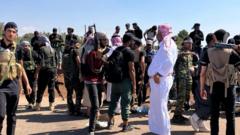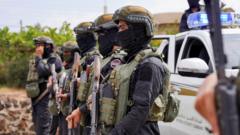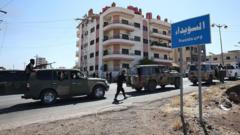### Summary: Following the fall of Bashar al-Assad in December 2024, Syrian citizens enjoy unprecedented social freedoms. However, concerns loom over democratic processes, potential religious influences, and the stability of the new regime.
### Title: The Fragile Freedom of Post-Assad Syria: A Cautious Outlook

### Title: The Fragile Freedom of Post-Assad Syria: A Cautious Outlook
### Description: As celebrations erupt following Bashar al-Assad's ousting, Syrians face uncertainty over the future of their newfound freedoms and democracy.
On the morning of December 8, 2024, I stood anxiously at the Lebanese border, eager to enter Syria and witness the historical changes unfolding. Bashar al-Assad, who presided over the country for 24 years, had been ousted, and opposition forces surged toward Damascus, capturing significant cities such as Aleppo. For many Syrians, including myself, the sight of a liberated Syria was surreal.
The Assads' reign had lasted over five decades, marked by disappearances, detentions, and an unrelenting civil war that began in 2011, resulting in the loss of hundreds of thousands of lives. Having been detained during the early stages of that uprising and forced to leave in 2013, I worried I would never see my homeland again. Yet, as I crossed the border to scenes of jubilation and celebratory gunfire, the mixed emotions of joy and disbelief overwhelmed me.
In the weeks following Assad’s fall, Damascus's Umayyad Square became a vibrant center for public discourse, where people of all ages spoke freely about politics—something previously unthinkable. However, four months into this new reality, the evolution of social freedoms presents a complex picture. As worries about the future of democracy and the role of Islam in governance arise, questions linger about the longevity of these liberties.
At Rawda Café, located near Parliament, intellectuals now gather openly—a stark contrast to the days when political discourse could end in arrest. Syrian journalist Mohammad Ghannam, who endured months in prison under Assad’s tyranny and recently returned from exile, expressed his exhilaration at the newfound freedoms. Similarly, Odai al-Zobi, a writer whose works were banned, remarked on the absence of censorship for the first time in years.
Syria’s rich cultural landscape, which the Assads attempted to showcase while clamping down on dissenting voices, has also begun to flourish. Bookstores now stock a variety of titles, including those previously banned. However, a subtext of concern persists, as there are fears that conservative clerics might seek to impose new restrictions on artistic expression.
Despite the fresh optimism, the ascent of Ahmed al-Sharaa as the new president has raised suspicions regarding the extent of political participation and the potential consolidation of power. While official dialogue aims to create a roadmap for democracy, critics argue that it lacks inclusivity and genuine representation. Already, political structures seem biased, with key appointments favoring former members of Islamist groups.
The rights of women, previously relatively protected under Assad, also hang in the balance. Advocates worry about the implications of a government that may align with stricter interpretations of Islamic law. Although no formal policies have emerged that threaten women's rights, concerns about their marginalization in politics and public life remain palpable.
Amidst this precarious scenario, random acts of violence plague various regions—remnants of the sectarian strife that could threaten the fragile peace. The landscape is charged with competing visions for Syria’s future, prompting questions of how the new government will balance these interests.
As the country navigates the emergence of a fragile democracy, the need for broad political openness becomes increasingly urgent. Many fear that without decisive measures to foster an inclusive political culture, Syria risks falling into the patterns of authoritarianism of the past. The road ahead for post-Assad Syria is uncertain, underscored by a collective apprehension towards the future of its newfound victories.






















